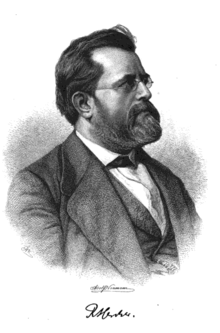Rudolf Hercher
Rudolf Hercher (born January 11, 1821 in Rudolstadt ; † March 26, 1878 in Berlin ) was a German classical philologist who worked as a high school teacher in Rudolstadt (1847-1859) and Berlin (1861-1878). He is particularly known as a conjectural critic of various Greek authors.
Life
Rudolf Hercher was the son of the high school professor and later finance advisor Johann Andreas Hercher. From 1830 to 1838 he attended the grammar school in his hometown, where the Latin teacher Lobegott Samuel Obbarius and the Greek teacher Christian Lorenz Sommer particularly influenced him. Before starting his studies, however, at the request of his father, he deepened his education for a year in the prima of the grammar school. He trained in German literature, drawing and English in particular. In the summer semester of 1839 Hercher moved to the University of Leipzig , where he studied for three years with Gottfried Hermann and Moriz Haupt . In 1842 he went to Berlin for two semesters , where he was instructed by the famous text critic Karl Lachmann . After receiving his doctorate in Jena (1844), Hercher became a private tutor to Hartwig Julius Ludwig von Both, member of the Bundestag in Oldenburg, that same year . After a year he resigned this position and traveled to relatives in Manchester and London for several months; After a short stay in Rudolstadt, he worked from Easter to autumn 1846 as a tutor to an Irish family in Dublin. He then traveled to London and the Netherlands for a few months.
After his former teacher Sommer died in the summer of 1846, Hercher was offered a position as a collaborator at the grammar school in Rudolstadt in December of the same year , which he accepted in 1847. After seven years of service he was appointed high school professor in 1854. In the following years Hercher had several opportunities to go on longer research trips: he visited Paris for several months and in 1859 went to Italy for a year; this stay was extended for another year because of an eye disease. His acquaintance with Immanuel Bekker and Gustav Parthey (1798–1872) in Berlin gave him a call to the Joachimsthal Gymnasium there , which he accepted in autumn 1861. Soon afterwards he was accepted as a member of the German Archaeological Institute in Rome, in whose central management he joined in 1865. He undertook further research trips to Ithaca and Corfu in 1863 and to Paris in 1867.
In Berlin, Hercher communicated with leading scientists, including Moriz Haupt, Immanuel Bekker, August Meineke ; with Theodor Mommsen and Adolf Kirchhoff he founded the magazine Hermes in 1866 . Journal of Classical Philology that still exists today. Intercourse with his specialist colleagues was so important to Hercher that he turned down three calls from universities abroad. On July 14, 1873, he was accepted as a full member of the Prussian Academy of Sciences and on December 19, 1875 as a corresponding member of the St. Petersburg Academy of Sciences .
In his later years, Hercher was troubled by a weakness of nerves that had developed into a serious ailment since the beginning of 1878. On March 26th of this year he passed away after a hemorrhage in the brain at the age of 58.
Services
Rudolf Hercher is particularly known for his achievements in the criticism of conjectural criticism . It mainly dealt with the Greek prose authors of the post-classical period, but also a few Homer , Herodotus and Latin authors. His first publication was a critical edition of the script περὶ ποταμῶν καὶ ὀρῶν ἐπωνυμίας , in which he not only produced the text, but also proved that the script was foisted on the Plutarch . He occupied himself with the book de venatione by Arrian , with Michael Psellos , Nikephoros Gregoras , the dream book of Akhmet, with Ptolemy Chennos and Philon of Byzantium .
His edition of Erotic Writers ( Erotici Graeci , two volumes, Leipzig 1858–1859), his first edition Astrampsychi oraculorum decades (Berlin 1863), his two-volume Aelian edition (Leipzig 1864–1866) and the Epistolographi Graeci (Paris 1873) caused a sensation . In his edition of Aineias Taktikos (Berlin 1870) he succeeded for the first time in restoring the text, which had been distorted by many interpolations, and in emphasizing the Attic style of the late antique prose writer. Only one volume of his edition of the Moralia des Plutarch appeared (Leipzig 1872).
In addition to these and other monographs, Hercher wrote hundreds of smaller contributions on textual criticism and exegesis. He repeatedly discussed the Homeric epics in particular. After his death, the archaeologist and philologist Carl Robert published these essays under the title Homeric Essays by Rudolf Hercher (Berlin 1881).
literature
- Alfred Eberhard : Hercher, Rudolf . In: Allgemeine Deutsche Biographie (ADB). Volume 12, Duncker & Humblot, Leipzig 1880, pp. 51-54.
Web links
- Rudolf Hercher's personnel sheet in the BIL's personal file in the archive database of the Library for Research on Educational History (BBF)
| personal data | |
|---|---|
| SURNAME | Hercher, Rudolf |
| BRIEF DESCRIPTION | German classical philologist |
| DATE OF BIRTH | January 11, 1821 |
| PLACE OF BIRTH | Rudolstadt |
| DATE OF DEATH | March 26, 1878 |
| Place of death | Berlin |
